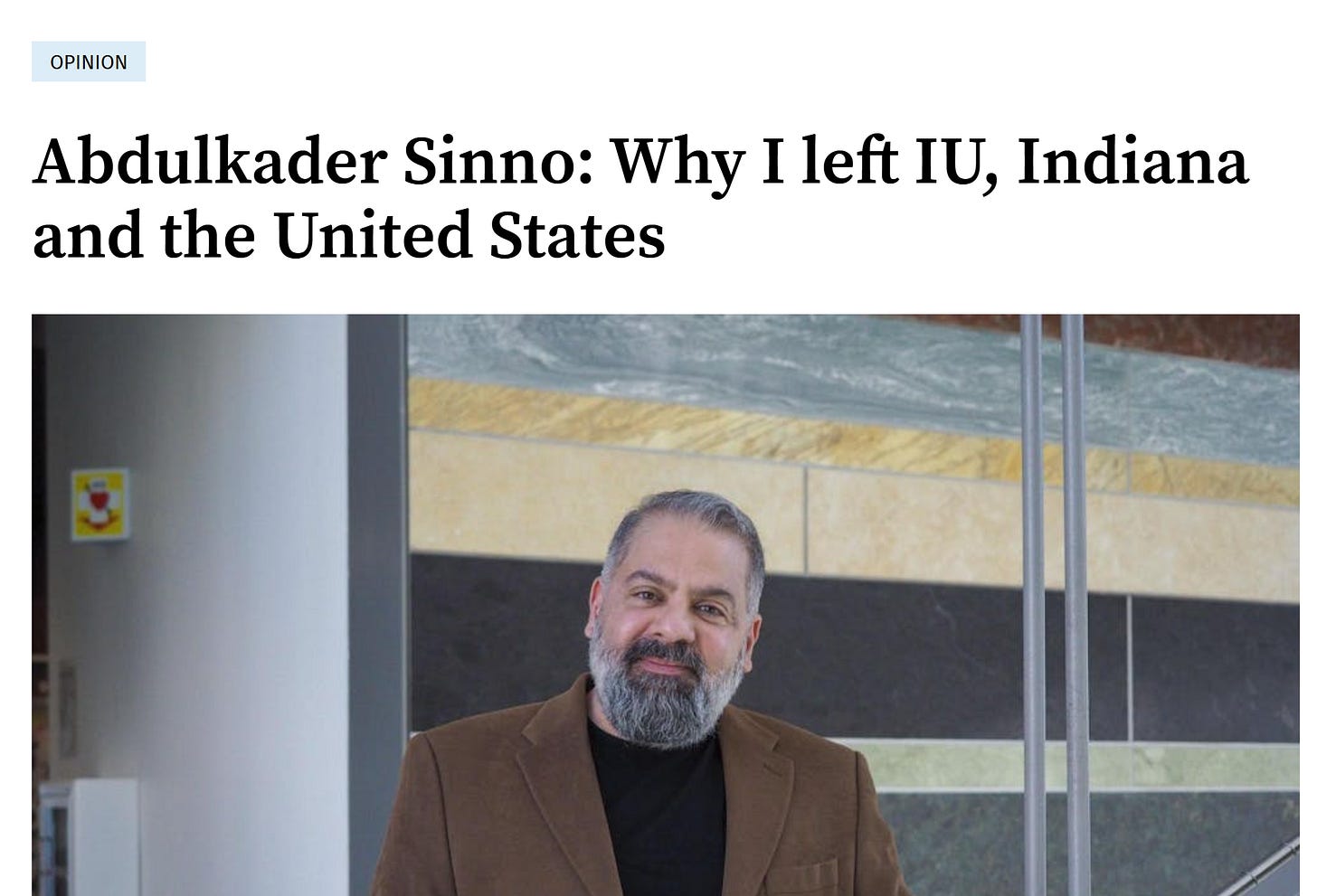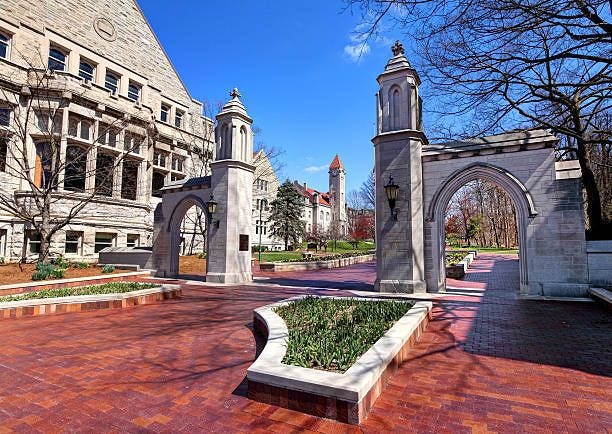Those Who Are Left Behind
A response to "Abdulkader Sinno: Why I left IU, Indiana and the United States"
I am a Sophomore at Indiana University majoring in Law and Public Policy and Public Policy Analysis. I am a naturalized Hoosier, and I went to high school under the shadow of Ross-Ade Stadium.
Like many of my fellow Hoosiers, the only reason I can afford to attend Indiana University Bloomington is because of the tuition exemption granted to me by my dad’s military service, and for that I’m grateful. Higher education remains an important piece of becoming a fulfilled and successful person, despite what people say about the shortcomings of our universities.
I believe in higher education, and it was drilled into me from a young age that curiosity, invention, and community were essential parts of life.
But why am I telling you this?
When I saw Abdulkader Sinno’s piece in the IDS on Tuesday, I was upset and disappointed.
I believe Professor Sinno and I agree on many points: that Whitten’s leadership has been a disaster for free speech, academic integrity, and inclusivity; that unionization is an important tool for pushing back against the administration; and that IU’s new policies will result in a loss of status.
So why am I so distraught over Sinno’s departure from Indiana University?
Well, in his own words:
I was a faculty member at Indiana University for 22 years. I am an award-winning teacher who deeply cares about my students and community. Yet, I decided to leave IU, Indiana and the United States to assume a new position at an excellent rising university in another country.
I left IU because IU President Pamela Whitten’s administration and the IU Board of Trustees, backed by Indiana’s state government and collaborating with ideological organizations, are waging war on IU’s faculty, mistreating IU’s staff and attacking IU’s students if they dare to express views the administrators and politicians do not agree with.
The IU community — students, staff, faculty, alumni and citizens — must mobilize to save IU from irreversible harm.
Professor Sinno claims that he “deeply cares about [his] students and community,” but he’s willing to abandon both to flee to Morocco. He even admits that it is the responsibility of “students, staff, and faculty” to save IU from Braun and Whitten’s policies, but does follow that standard himself. Professor Sinno is being hypocritical, and his behavior will embolden Whitten, who is actively turning IU into her personal fiefdom.
And let’s not pretend that Morocco represents some shining alternative for free expression and academic independence. Reporters Without Borders ranks Morocco near the bottom globally for press freedom, with journalists routinely harassed, censored, or even imprisoned for crossing political “red lines.”
Universities are not exempt from this atmosphere of control. Faculty and students who speak too openly about the monarchy, the Western Sahara conflict, or Islam risk state retaliation. Academic freedom there is fragile at best, heavily constrained by political realities that would make even Whitten’s IU look permissive in comparison.
So when Professor Sinno claims to be leaving in defense of free speech and academic freedom, but then chooses to work in a country where those very freedoms are curtailed by law, it raises serious questions.
If his priority was truly to protect the principles of open inquiry, why exchange an imperfect but contested space like IU—where students and faculty still have avenues to fight back—for an environment where those avenues barely exist?
Dictatorships function best when they operate on fear of prosecution, and when those who might resist decide it is easier to walk away. By leaving, Professor Sinno strengthens Whitten’s grip on power. Every faculty member who abandons IU rather than staying to fight makes her job simpler. Empty offices don’t challenge administrative overreach; they simply create space for ideologically compliant hires.
To me, the real test of one’s commitment to free speech, academic integrity, and inclusivity is not what you say in an op-ed after resigning—it’s what you’re willing to risk while you’re still here. If students like myself, who are barely adults and whose futures are not guaranteed, are expected to take up this fight, then surely our professors, with tenure protections and decades of influence, must carry their share of the burden.
I don’t doubt Professor Sinno’s passion for teaching, nor do I question the pain he must have felt watching IU deteriorate under Whitten’s leadership. But passion without courage is not leadership. Professors have the privilege and the platform to organize, to resist, to show students that standing up to power is possible. Leaving for another country may be good for his career, but it abandons the very students he claims to “deeply care” about.
The truth is, IU cannot be saved by op-eds alone. It will be saved, if at all, by people who refuse to give up. And I refuse to give up, because—like many students at IU—it is my only chance at higher education.
But Professor Sinno seems ignorant of this possibility:
Many of IU’s best teachers and researchers are leaving or retiring early to avoid dealing with IU’s new toxic culture. They are IU’s loss and other universities’ gain. This will undoubtedly bring down the quality of teaching at IU and the ranking of the university, which will in turn hurt the standing of its graduates and its ability to attract promising students.
As damage spreads at IU, the best Hoosier students will choose to go to college outside the state, leading to brain drain and causing harm to the Indiana economy and business community.
The harmful changes instituted by Whitten also impede the recruitment of new faculty to fill important gaps in departmental offerings. A sensible candidate would accept an offer promising real tenure at another university over one with pretend tenure at IU.
Indiana University is my home, and I will not abandon it to find a “college outside the state” because I cannot afford such college. Even public universities in neighboring states can cost between 30k and 40k in tuition to attend. That is 30k to 40k in cost that I cannot bear, not because I am a bad student, but because there is very little available aid to go around.
As a professor of 22 years, it is unconscionable that Sinno does not consider the possibility of students who cannot afford to go anywhere else. He is effectively advocating for students like me to suffer at a subpar institution, in a community he allegedly “deeply cares about” but is willing to abandon for his own self interest.
I love this community. I walk the B-line trail every morning to class, and I’ve met friends I love here. IU will be saved by students who keep showing up, staff who refuse to be silenced, and faculty who are willing to stay in the trenches instead of retreating when the battle gets difficult.
I will not abandon this community, and I hope that’s enough.




